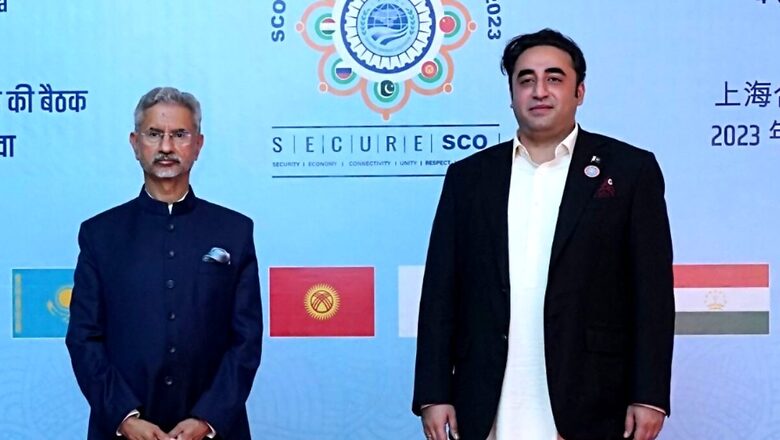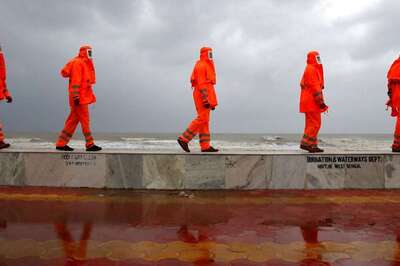
views
On the same day as foreign ministers of the Shanghai Cooperation Organisation (SCO) gathered for a meeting in Goa, India experienced a devastating attack in the Rajouri district of Jammu and Kashmir by Pakistan-backed Lashkar-e-Toiba (LeT) terrorists. The simultaneity of these events seemed to be calling out the glaring inconsistency in Pakistan’s position as a full member of the SCO, whose stated objective is to work together to combat terrorism, extremism, and separatism, and to create a regional security structure that is free of radical forces.
Pakistan’s words and deeds were so considerably at odds with one another that India’s External Affairs Minister, S Jaishankar, in one of his sharpest attacks, had to call out Bhutto as the “promoter, justifier and spokesperson of a terrorism industry.” In his address at the SCO Council of Foreign Ministers’ meeting, Jaishankar said, “taking the eyes off terrorism would be detrimental to the security interests of the grouping” and that when the world was engaged in facing the Covid pandemic and its consequences, the “menace of terrorism continued unabated”, a clear reference to Pakistan.
Maintaining the facade of a cohesive counter-terrorism framework under the tutelage of SCO, Pakistani foreign minister Bilawal Bhutto stated that he and his country were “firmly committed to being part of regional and global efforts for eradicating this menace” and that the SCO’s member countries should adopt a “comprehensive and collective approach” instead of engaging in “diplomatic point scoring” and “geopolitical partisanship.”
“Terrorism continues to threaten global security,” he remarked. “Let’s not get caught up in weaponising terrorism for diplomatic point scoring.” Bhutto’s unhinged remarks about adopting “practical, pragmatic solutions” to put an end to the chapter of terrorism “once and for all” seemed to be coloured by a palpable sense of naivety.
FM @BhuttoZardari urged to collectively eradicate the menace of terrorism????" Let’s not get caught up in weaponising terrorism for diplomatic point scoring"#PakFMatSCO pic.twitter.com/H5awOoQDF5
— Spokesperson ???????? MoFA (@ForeignOfficePk) May 5, 2023
Bhutto’s advocacy for discontinuing the erroneous association of non-state actors with state actors is a clear manifestation of his intention to persist with the policy of recantation of Pakistan’s role in terrorism and feigning an unyielding commitment to counter-terrorism efforts. This is evident in his failure to acknowledge the unquestionable patterns of linkages between the Pakistani state and the terrorist networks thriving in the country.
Pakistan’s insensitive remarks come just days after the horrific Poonch terror attack where five Indian soldiers lost their life. It is a glaring reminder that Pakistan has little to no intention of addressing the menace and is, instead, fixated on playing the victim card, peddling a false narrative that it is falsely demonised by the Indians, instead of admitting that it harbours the world’s largest terror factory. Pakistan’s refusal to admit to being the epicentre of global terrorism is akin to turning a blind eye to the elephant in the room.
EAM Jaishankar, in a decisive move, refused to turn a blind eye to Pakistan’s hypocritical stance on terrorism during the recent meeting of the SCO. He boldly stated that discussions on terrorism cannot be held with perpetrators and that the victims of terrorism must defend themselves and delegitimise this heinous act. This was an important signalling from India, indicating that it no longer wishes to entertain Pakistan’s age-old narrative that Islamabad is also a victim of terrorism and that the two nations are in the same boat.
Bilawal Bhutto Zardari’s call for India to create a conducive environment for talks sounds like a mellifluous tune with a tinge of deceit and duplicity. It does not sit well with the trajectory of Pakistan’s tumultuous relationship with India. Moreover, Bhutto’s foul statements at SCO cannot be viewed in isolation.
Minister of State for Foreign Affairs, Hina Rabbani Khar, had previously stated during a press conference in Islamabad that “no country had used terrorism better than India.” She went on to say that India was portraying itself as a champion of counter-terrorism even though it had not made any contributions in this regard while Pakistan has always been at the “forefront of counter-terrorism.” This, coupled with Bhutto’s unrelenting and hostile attitude and remarks on Indian Prime Minister Narendra Modi, only reinforces the already existing schism between the two countries.
India’s security concerns vis-a-vis Pakistan are well-placed and cannot be dismissed with mere talks of unified and pragmatic responses to fight terrorism. It is no secret that Pakistan has been acting as a ‘safe haven’ for terrorist organisations for decades, with well-known think tanks such as the Brookings Institution listing it as the “world’s most active sponsor of terrorist groups.” Former US President, Donald Trump, had also openly reproached the Pakistani government for harbouring terrorists and demanded that they take responsibility for the consequences of their actions.
Thus, it comes as no surprise when security analysts paint a grim picture of the future of India-Pakistan relations. Any talk of India and Pakistan needing to fight terrorism together remains meaningless until Rawalpindi decides to truly change.
Bhutto’s latest stint at SCO only highlights the great significance the country attaches to the grouping, and only serves as a reminder that Pakistan has no intentions of mellowing its apathy for India, as it will disrupt the status quo that best serves their political agenda. To echo Kanwal Sibal’s words, Bhutto was a “representative of a rogue state (who) engaged in Oxford-accented rogue diplomacy in India.”
Esha Banerji is presently associated with a premier think-tank in India, specialising in defence, security, and strategic studies. Her research interest and focuses of analysis are defence strategy, geo-economics, foreign affairs, and the implications of Chinese security developments on the region, especially India. Views expressed are personal.




















Comments
0 comment